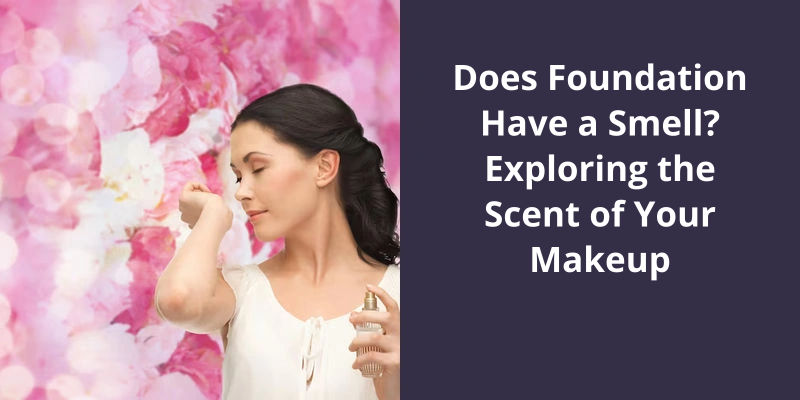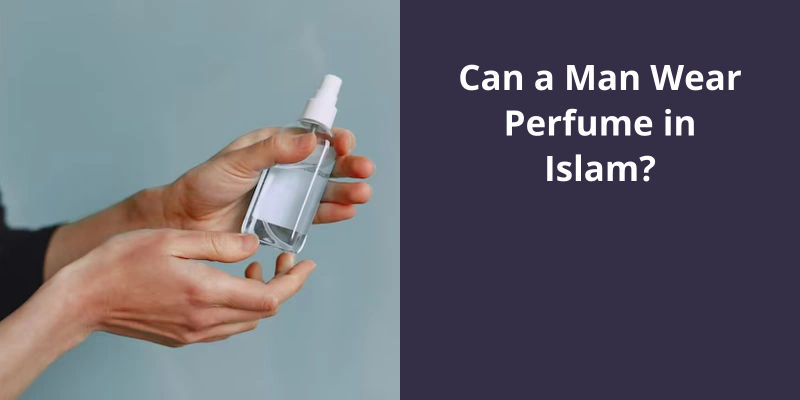Yes, foundation can have a smell. The specific scent can differ based on the brand or the ingredients used in the product. Some foundations don’t have any added fragrance, so their scent is more neutral or smells vaguely of the ingredients it contains, which might be waxes, oils, or minerals. Others might have a stronger scent if they include certain oils, botanical extracts, or are perfume-laden. However, if a foundation that’s normally fragrance-free starts smelling strange or rancid, it could be a sign that the product is expired and it’s time to replace it.

How Can You Tell if Foundation Is Expired?
If you notice an odd smell coming from your foundation when you apply it, it could be a sign that the product has gone bad. The scent can take on a rancid or sour smell when it’s reached it’s expiration date. If this happens, it’s best to stop using the foundation and replace it to avoid any skin irritation or issues that may arise from using expired products.
Most foundations have a shelf life of around one to two years before they start to go bad. If you cant remember when you last bought the product, it’s best to err on the side of caution and assume it’s expired if you notice any of the other signs mentioned.
It’s also important to note that using expired foundation can mean that you’re exposing your skin to harmful bacteria. This can cause breakouts, irritation, or other skin problems that can be difficult to get under control. This is why it’s crucial to make sure that your makeup is fresh and not expired before using it on your skin.
Lastly, you might want to check the packaging of your foundation to see if it’s an expiration date listed on it. Some foundations will have a symbol that looks like a small jar with numbers inside. This is the “period after opening” label and it will tell you how long your product will last once opened. If you cant find an expiration date, it’s still essential to check for signs of expiry before using the product. Overall, being aware of all these warning signs will help you to keep your makeup kit fresh, safe, and problem-free.
The Effects of Using Expired Makeup on Different Skin Types
- Expired makeup can cause skin irritation and allergic reactions.
- For those with sensitive skin, using expired makeup can cause inflammation and redness.
- Oily skin types may experience breakouts and acne from using expired makeup.
- Using expired eye products can lead to infections and irritation.
- Expired lip products can cause dryness and cracks in the lips.
- Expired sunscreen can lose it’s effectiveness, leaving the skin vulnerable to damage.
- It’s important to check expiration dates and properly dispose of expired makeup to avoid negative effects on the skin.
It’s always a good idea to be mindful of the quality of your makeup products, especially when it comes to their scent. The last thing you want is to apply a product that’s gone bad and might end up harming your skin. With that being said, let’s explore some other signs that indicate it’s time to replace your makeup items.
When Makeup Smells Bad?
Makeup is an important part of many peoples daily routines, serving to enhance features and boost confidence. However, when makeup starts to smell bad, it can be a major problem. As makeup ages, the oils, pigments, and preservatives that once kept it fresh and effective may start to break down, leading to an unpleasant odor.
If you notice an off-putting smell coming from any of your makeup products, it’s best to get rid of them. Continuing to use them could lead to irritation or other skin problems. This can cause frustration and disappointment, particularly if youre counting on your makeup to last all day.
One of the most obvious signs that makeup is past it’s prime is separation. For example, if your foundation starts separating into layers, it may have expired. Similarly, mascara that’s become thick and dry on the wand may be too old to use. Products that have been opened for a while are more likely to have this problem, so it’s important to track how long youve had a product and toss it out if it starts to show signs of age.
Ultimately, if youre concerned about the smell of your makeup, it’s always better to err on the side of caution. Replacing old products with fresh ones can help you avoid the frustration of ineffective makeup and prevent skin irritation or damage. By being vigilant about the condition of your cosmetics, you can ensure that youre always looking and feeling your best. So if your makeup smells bad, don’t hesitate to throw it out and replace it with something new and fresh.
How to Properly Store Makeup to Prolong It’s Shelf Life and Prevent Bad Smells
- Always keep makeup in a cool, dry place, away from direct sunlight and humidity.
- Store powders, like eye shadows and blushes, in airtight containers to prevent them from drying out.
- Keep liquids, like foundations and concealers, tightly capped and stored upright to prevent leakage.
- Never share makeup with others to prevent cross-contamination and the spread of bacteria.
- Consider buying travel-sized versions of your favorite products to prevent waste and overuse.
- Check expiration dates regularly and dispose of any expired or old makeup.
- Use a clean brush or applicator every time to prevent bacteria buildup and contamination.
- Consider investing in a makeup fridge to keep products cool and extend their shelf life.
- Don’t store makeup in the bathroom, as the humidity and moisture can cause products to spoil faster.
It’s important to be aware of the signs that your makeup has gone bad, and one key indicator is unpleasant odors. Rancid makeup can release a range of different smells, and these can vary depending on the type of product and the ingredients it contains. If you’ve noticed strange or unpleasant smells coming from your makeup, it’s time to throw it out and replace it with fresh, new products. In the following sections, we’ll explore some of the common causes of rancidity in makeup, as well as ways to prevent it from happening in the future.
What Does Rancid Makeup Smell Like?
Foundation, on the other hand, can give off an overall unpleasant odor that’s reminiscent of rotten eggs or sulfur. This smell may be more noticeable when the product is opened or applied to the skin. The texture and consistency of the product may also change, becoming clumpy or separated.
Rancid makeup is caused by the breakdown of the products ingredients over time. Exposure to air, humidity, and bacteria can all contribute to the spoiling of makeup. This can be exacerbated by improper storage, such as leaving products in direct sunlight or in a hot and humid environment, as well as using expired products past their recommended use-by date.
It’s recommended to regularly clean and sanitize makeup brushes and sponges, and to dispose of any makeup that’s gone bad. It’s also important to pay attention to product expiration dates and to avoid sharing makeup with others in order to prevent the spread of bacteria.
If you suspect that your makeup has gone bad, it’s best to err on the side of caution and dispose of the product. Trying to salvage a product that’s gone rancid can do more harm than good, and may lead to further skin irritation or infection. It’s important to invest in high-quality products from reputable brands, and to store them properly in order to extend their shelf life and ensure their safety for use. By taking the necessary precautions to maintain the integrity of your makeup products, you can enjoy them for longer and keep your skin looking and feeling healthy.
How Can You Tell if Your Makeup Has Gone Bad Before Using It?
- Check the expiration date on the packaging to see if it’s passed
- Look for changes in the texture or consistency of the product
- Smell your makeup to see if it’s a strange or off scent
- Check for discoloration or separation of the product
- Throw away any makeup that’s been exposed to heat or moisture
- Don’t share makeup with others to avoid cross-contamination
- Be vigilant about regularly cleaning and sanitizing your makeup brushes
It’s important to understand what causes foundation to oxidize so that you can take preventative measures and maintain a flawless complexion. While there are a variety of factors that can contribute to oxidation, one of the most common culprits is the combination of makeup and natural skin oils. This reaction can cause your foundation to darken or change color, resulting in an uneven or unnatural finish.
What Causes Foundation to Oxidize?
This process is known as oxidation and it can happen to any type of foundation, whether it be liquid, cream, powder, or mineral. Oxidation occurs when the pigments in your foundation react with the oxygen in the air, causing them to become darker or change color.
One of the main culprits behind foundation oxidation is sweat, which can cause your foundation to break down and separate from your skin. This is especially true if you’ve oily or combination skin, as excessive oil production can cause your makeup to become greasy and slide off your face.
Another factor that can contribute to foundation oxidation is sun exposure. UV radiation from the sun can cause your foundation to become discolored, especially if it contains certain types of pigments or dyes that are sensitive to light. To prevent UV damage to your foundation, it’s important to invest in a sunscreen or moisturizer with SPF protection.
Smoke, dirt, and other airborne particles can get trapped in your foundation, causing it to oxidize and change color. Additionally, certain types of skincare products, such as toners and exfoliators, can strip your skin of natural oils and contribute to foundation oxidation.
To prevent foundation oxidation, consider investing in high-quality makeup products that are specifically formulated to resist oxidation and UV damage. Additionally, be sure to properly store and apply your foundation, and cleanse your skin regularly to prevent buildup of pollutants and oils.
The Effects of Humidity on Foundation Oxidation
Humidity can accelerate the oxidation process of foundations, leading to structural damage over time.
Now that we know about the various causes of foundation oxidation, let’s take a look at some practical solutions to prevent it. By incorporating a few of these tips, you can keep your foundation looking fresh and flawless all day long.
How Do I Stop My Foundation From Oxidizing?
One common beauty problem among makeup lovers is the dreaded oxidation of foundation. Oxidation occurs when the foundation reacts with the natural oils on your skin, causing it to turn a shade darker and potentially orange or yellow. This can be particularly frustrating if youve spent a lot of time choosing a perfect foundation shade that complements your skin tone.
Thankfully, there are several ways to prevent foundation from oxidizing. Using a primer is one of the most effective methods. A silicone-based primer creates a barrier between your skins natural oils and the oils in foundation, which reduces the chance of oxidation. The primer helps to keep your makeup in place for longer, and also helps foundations go on smoother on the skins surface.
Blotting is another trick to prevent oxidation. When your skin gets oily throughout the day, it can break down the foundation, leading to oxidation. Blotting paper helps to absorb excess oil while leaving the foundation undisturbed. You can use a tissue paper or blotting paper or even a clean handkerchief to help keep things looking fresh and avoid any oxidation of the foundation during the day.
Another excellent option to stop oxidation of a foundation is to opt for a sheerer formula. These formulas tend to have less pigment, which leads to less oxidization. Sheerer formulas like tinted moisturizers, BB creams, and CC creams are great options for people who want to skip heavier coverage foundations. These formulas also tend to be more hydrating and beneficial for the skin, letting you achieve a natural finish while reducing the chances of oxidizing.
Finally, you can try using a finishing powder over the foundation to avoid oxidization. Setting powders help to lock the foundation in place, and they can absorb excess oils and prevent oxidization. However, it’s crucial to choose the right finishing powder that complements your foundation shade and skin tone. Many colored powders can cause the foundation to turn orange, so ensure you pick a translucent or a shade that doesn’t clash with your foundation tone.
Conclusion
Some individuals may detect a noticeable scent while others may not pick up on any odor at all. It’s important to note that the ingredients and formulation of the foundation product can influence it’s smell. Additionally, personal health and lifestyle choices can also impact an individual's ability to detect scents.





